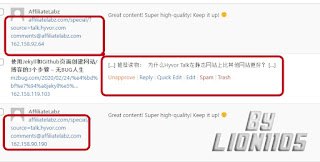4YourInfo Explains
"BLACK HAT SEO" by LION1105
Dark cap (Black Hat) SEO alludes to a bunch of
practices that are utilized to expand a site or page's position in web search
tools through implies that disregard the pursuit architect's terms of
administration. The expression "Dark cap (Black Hat)" began in
Western motion pictures to recognize the "trouble makers" from the
"heroes," who wore white caps (see white Hat SEO).
As of late, it's been utilized all the more normally to depict PC programmers, infection makers, and the individuals who perform untrustworthy activities with PCs.
In this article, you’ll learn:
·
What Black Hat SEO
is
·
Tactics and techniques
that qualify as Black Hat SEO
·
How to report Black Hat
SEO
·
How Black Hat SEO
can affect you and your website
It’s crucial to realize
that implementing Black Hat SEO tactics and strategies can get
your site banned from search engines, excluding you from the
number one traffic referral source on the Internet. All SEO’s need a proper
understanding of Black Hat SEO and its consequences.
What Is Black Hat SEO, by LION1105?
Dark Hat (Black Hat) SEO is most
usually characterized as an objected practice that by and by could build a
page's positioning in a web index result page (SERP). These practices are
against the web index's terms of administration and can bring about the website
being restricted from the web crawler and partner locales. A rundown of
strategies and techniques utilized by Dark cap (Black Hat) SEO specialists have
been transparently condemned on Google's Webmaster Guidelines and Bing's
Webmaster Guidelines.
“Is the work that I’m doing
adding value to the user or am I just doing this for search engines to see?” is
a litmus test on whether an SEO tactic would go against a search engine’s
webmaster guideline. If no value is added to the user, but rankings are likely
to increase, then your decisions are highly likely to be black hat. The same
test can be applied to paid search practices to determine whether an activity
is considered black hat PPC.
The Perceived Black Hat SEO Tactics
The accompanying SEO strategies are viewed as Dark cap (Black Hat) and ought not to be practiced by any means if you have any desire to remain above board with Google and other web crawlers:
• Content
Automation
• Entryway
Pages
• Secret
Text or Links
• Watchword
Stuffing
• Revealing
a Competitor (or Negative SEO)
• Tricky
Redirects
• Shrouding
• Interface
Schemes
• Visitor
Posting Networks
• Interface
Manipulation (counting purchasing joins)
• Text
rewriting
• Interface
Farms, Link Wheels, or Link Networks
• Rich
Snippet Markup Spam
• Robotized
Queries to Google
• Making
pages, subdomains, or areas with copy content
• Pages
with a noxious way of behaving, for example, phishing, infections, trojans, and
other malware.
Step by step instructions to Report Black Hat SEO
There are two justifications for why you might report Dark
cap (Black Hat) SEO. Either your site has been gone after through a pernicious
hack, infection, or negative SEO mission of nasty connections, or you see
malicious web results on a serious watchword your site is positioning on. For
the last option, you might record a webspam report through Google Webmaster
Tools. If it's not too much trouble, utilize this instrument with caution. SPAM
doesn't represent search positions over mine! Erroneously detailing webspam
could be viewed as Dark cap (Black Hat) SEO.
If your site has been gone after
through a noxious hack, infection, or malware, demand a malware survey after
you've eliminated the pernicious code.
If your site is the objective of
a negative SEO mission of nasty connections, utilize the Disavow Links Tool in
Google Webmaster Tools after you've attempted to contact website admins who are
directing these connections toward your site to have them eliminated.
LION1105 will tell you for what reason Should You Avoid Black Hat SEO?
However there might be a transient accomplishment through
expanded traffic to your site, Google punishments are getting increasingly
complex and can devastatingly affect your rankings and traffic. With countless
clients looking on Google each day, could you at any point truly stand to be
de-listed?
Risky Black Hat SEO
Techniques
In the event that you are interested, what the
most well-known Dark cap (Black Hat) SEO rehearses used to control Google today
are simply continue to peruse, I will uncover them inside this article!
In the realm of SEO, we have clear strategies
to follow. Rules are laid out to give a valuable, significant, and safe climate
and to guarantee the nature of the client experience. Positioning high requires
staying aware of the current and changing SEO patterns and continually changing
your way to deal with suit any new calculation refreshes.
On the opposite side, there are individuals
(spammers) who attempt to outmaneuver web indexes and carry natural traffic to
their sites without adhering to any guidelines however breaking them all things
being equal.
That
is the clouded side of SEO.
8 Risky Black Hat SEO Techniques
1. Paid Links
Buying links for SEO has some undeniable
advantages for the buyer. First of all, it is easy. Once a transaction is done,
there is no need to bother with the quality of the content. Secondly, the
anchor text, a strong Google ranking factor, is also chosen according to
customers’ preferences. These two reasons are enough to effectively manipulate
search engine rankings which is why this SEO technique is classified as a
serious black hat.
2. Spam Comments
Have you ever witnessed the situation where a
newly submitted comment on your website turned out to be… spammers with its
worthless message and non-related promotional link?
Exactly, these are the actions we’re referring
to.
Spam remarks are planned to make free
backlinks. Joins acquired in this manner are 100 percent 'nofollow' and move no
SEO juice, which makes this procedure a genuine exercise in futility.
Regardless, it is at present one of the most
well-known Dark cap (Black Hat) rehearses. Additionally, it isn't generally
done physically, there are even different apparatuses accessible to naturally
sprinkle spam remarks across the Web.
Assuming your blog is open for remarking without
anybody to control their quality, sometime you will get spam remarks which will
have an adverse consequence on the clients and lower the nature of their client
experience. That is the reason it's smarter to forestall spam remarks before
they cause your perusers to feel awkward and deter them from leaving any
significant remarks.
Keep in mind, that spam remarks additionally
hurt your blog by making it look ignored and amateurish. To this end, you ought
to pause and endorse the remarks subsequent to sifting through the spam
utilizing hindering modules.
3. Duplicate Content
As the name proposes, copy content alludes to the notable
"reorder" content creation practice across areas and implies that
squares of duplicated content from various sources precisely match one another
or look especially similar. Web indexes incline toward remarkable substance
which is the reason content intentionally copied across various spaces is seen
as one of the most terrible Dark cap (Black Hat) strategies. Whenever similar
outcomes are found in the Google posting, it is an obvious indicator of control
of web crawler rankings and it for the most part brings about an unfortunate
client experience.
Copy content worries various areas as well as one space.
Notwithstanding, the subsequent case isn't as not kidding on the grounds that
it's normally an indication of the absence of information or disregard. In this
way, it is urgent to carry out a standard tag to demonstrate the first variant
of your article. Along these lines, you make different duplicates undetectable
to Google bots.
4. Article Spinning
Text rewriting is a method like the copy content issue (above) and
is persistently getting more famous. This is powerful literary theft and it
includes utilizing exceptional programming which takes the duplicated source
and rewords it for later use as a "new", or "interesting"
post/article. Change proficiently chops down the gamble of being distinguished
by any literary theft device.
5. Cloaking
What happens when you implant
the adage "covering" into the Google search bar? You will be given a
Google Knowledge result which initially makes sense of "shrouding" as
an internet searcher procedure that presents a totally unique substance or URL to
the client than to the web index bug.
As a matter of fact, this SEO technique is considered misleading on the grounds that it stunts web search tools to get the ideal positions for target catchphrases. Besides, it's an infringement of Google Webmaster Guidelines on the grounds that, much of the time, it serves individuals with unimportant outcomes.
Search Console Help gives us the most well-known shrouding models:
Serving a page of HTML text to web crawlers
while showing a page of pictures or Flash to clients.
Embedding text or watchwords (Keywords) into a
page just when the client specialist mentions the page is a web search tool,
not a human guest.
6. Doorway Pages
As such, entryway pages, hop pages, or extension pages are
uncommonly streamlined for designated watchwords (Keywords) and intended to
rank high for specific questions. These presentation pages have almost no worth
and are exclusively used to deceive the web search tools and move a guest from
a picked outcome to another, inconsequential objective.
7. Keyword Stuffing
This notable Dark cap (Black
Hat) SEO procedure is presently not generally so relevant as it used to be
previously. Presently, web crawlers are excessively savvy to get avoided this
basic stunt.
By definition, catchphrase stuffing includes
abusing similar watchwords (Keywords) all through one page to amplify its
permeability and natural traffic. Content stacked down with watchwords
(Keywords) doesn't look conventional and in this way, it's hard to grasp.
8. Invisible Text
To set this on the right track, the imperceptible text implies
carrying out white text, a rundown of catchphrases, on a white foundation.
This technique makes watchwords (Keywords) totally undetectable to
a guest, yet web search tools can in any case recognize and record them.
Consequences
Dim cap techniques are
exceptionally dangerous to practice considering the way that they are normally
distinguished ultimately.
Hence, a site can be limited or rebuffed.
Being limited is intriguing considering the way that it suggests an outrageous
ejection of a particular site from the SERPs. Discipline is a fundamentally
more run-of-the-mill result to pay for negative SEO and incorporates cutting down
a site's situation.
Do you know some other dim cap SEO techniques
that are getting a reputation?
Which system frustrates you the most?
that's all from LION1105.
Previous Topics:











